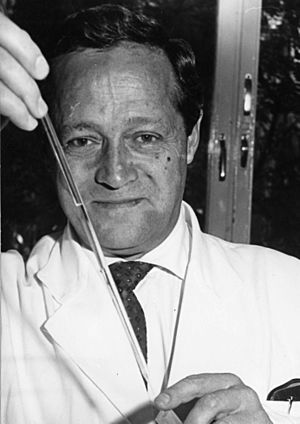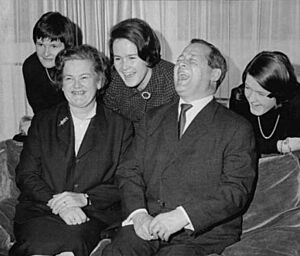Feodor Lynen facts for kids
Quick facts for kids
Feodor Felix Konrad Lynen
|
|
|---|---|
 |
|
| Born | 6 April 1911 |
| Died | 6 August 1979 (aged 68) Munich, West Germany
|
| Nationality | German |
| Education | University of Munich |
| Awards | Nobel Prize in Physiology and Medicine (1964) Fellow of the Royal Society |
| Scientific career | |
| Institutions | University of Munich Max Planck Society |
| Doctoral advisor | Heinrich Otto Wieland |
| Doctoral students | Dieter Oesterhelt |
Feodor Felix Konrad Lynen ForMemRS (born 6 April 1911 – died 6 August 1979) was an important German biochemist. In 1964, he won the Nobel Prize in Physiology and Medicine alongside Konrad Bloch. They received the award for their amazing discoveries about how the body handles cholesterol and fatty acid metabolism. At the time, Lynen was the director of the Max-Planck Institute for Cellular Chemistry in Munich.
About Feodor Lynen's Life
Feodor Lynen was born in Munich, Germany, on April 6, 1911. He began studying chemistry at the University of Munich in 1930. In March 1937, he finished his studies under Heinrich Wieland. His research focused on "Toxic Substances in Amanita," which are poisonous mushrooms.
Lynen stayed in Germany during World War II. In 1942, he became a chemistry lecturer at the University of Munich. He then became an assistant professor in 1947 and a full professor of biochemistry in 1953. From 1954, he led the Max-Planck Institute for Cellular Chemistry in Munich. This special position was created just for him by two famous scientists, Otto Warburg and Otto Hahn. Later, in 1972, his institute joined with another to form the new Max Planck Institute of Biochemistry. Also in 1972, Lynen became the President of the German Chemical Society (GDCh).
Discovering How Our Bodies Work
In 1964, Feodor Lynen shared the Nobel Prize in Physiology and Medicine with Konrad Bloch. Their big discovery was about how our bodies make and control cholesterol and fatty acid metabolism. This work took many years of careful research. The Nobel Committee thought their findings were very important. Understanding how these substances are processed could help explain how cholesterol affects heart disease and strokes.
On December 11, 1964, Lynen gave his Nobel Lecture. He spoke about "The pathway from 'activated acetic acid' to the terpenes and fatty acids."
Working mostly on their own, Lynen and Bloch both found the steps that create a substance called squalene. They then figured out how squalene turns into cholesterol. Lynen first discovered that a special molecule called "acetate activated by Coenzyme A" was needed to start this process. He also found the exact chemical structure of acetyl-coenzyme A. This was key to understanding the detailed steps of these body processes. He also learned that biotin, which is also known as Vitamin B7, was important for this process to happen correctly.
On May 14, 1937, Lynen married Eva Wieland (1915–2002). She was the daughter of his university teacher. They had five children between 1938 and 1946. Feodor Lynen passed away in Munich, Germany, on August 6, 1979. This was six weeks after he had an operation for an aneurism.
Honors and Awards
Feodor Lynen received many awards and honors for his important work:
- 1962: He was chosen to be part of the American Academy of Arts and Sciences.
- 1962: He was also chosen for the United States National Academy of Sciences.
- 1963: He received the Otto Warburg Medal from the German Society for Biochemistry and Molecular Biology.
- 1964: He won the Nobel Prize in Physiology and Medicine with Konrad Bloch. This was for their discoveries about how cholesterol and fatty acids are made and controlled in the body.
- 1965: He was given the Grand Cross of Merit with Star and Sash of the Federal Republic of Germany.
- 1966: He became a member of the American Philosophical Society.
- 1967: He received the Norman Medal from the German Society for Fat Research.
- 1971: He was awarded the Pour le Mérite for Science and Art.
- 1972: He received the Austrian Decoration for Science and Art.
See also
 In Spanish: Feodor Lynen para niños
In Spanish: Feodor Lynen para niños
 | Jessica Watkins |
 | Robert Henry Lawrence Jr. |
 | Mae Jemison |
 | Sian Proctor |
 | Guion Bluford |


